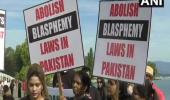Succumbing to the demands of a radical Islamist party, the Pakistan government has agreed to try blasphemy suspects under terrorism charges in addition to the other sections of the country's penal code.

The Tehreek-i-Labbaik Pakistan (TLP) ended its 25-day-long march protest at Sarai Alamgir, Gujrat district, some 200 km from Lahore, on Saturday after signing a pact with the Pakistan Muslim League-Nawaz (PML-N)-led federal government.
Federal Interior Minister Rana Sanaullah said the government has accepted 'all legitimate' demands of the TLP, especially on blasphemy laws.
In a 12-point agreement signed on Saturday with the TLP, the federal government agreed to book those accused of committing blasphemy and charged with Section 295-C (use of derogatory remarks, etc., in respect of the Holy Prophet) of Pakistan Penal Code under the Anti-Terrorism Act (ATA), 1997, too.
"Besides, speedy trials of the blasphemy accused will be ensured. For the first time, a Counter Blasphemy Wing (CBW) will be established under the Federal Investigation Agency (FIA)," Sanaullah said, adding the government would ensure steps to block blasphemous content on social media.
The radical Islamic group gained political capital as the federal government agreed to issue a letter declaring that the TLP was not a terrorist organisation, the Dawn newspaper reported.
The government also conceded to lift the ban on the coverage of TLP on broadcast and social media while agreeing to withdraw all political cases filed against TLP workers and leaders.
Sanaullah said the TLP leaders whose names have been taken off the Fourth Schedule of the Anti-Terrorism Act, 1997, will have the freedom of movement, and the federal government will issue directives to provincial governments for it.
According to Amnesty International, Pakistan's blasphemy laws are often used against religious minorities and others who are the target of false accusations.
The addition of terrorism charges will make the blasphemy suspects more vulnerable.









